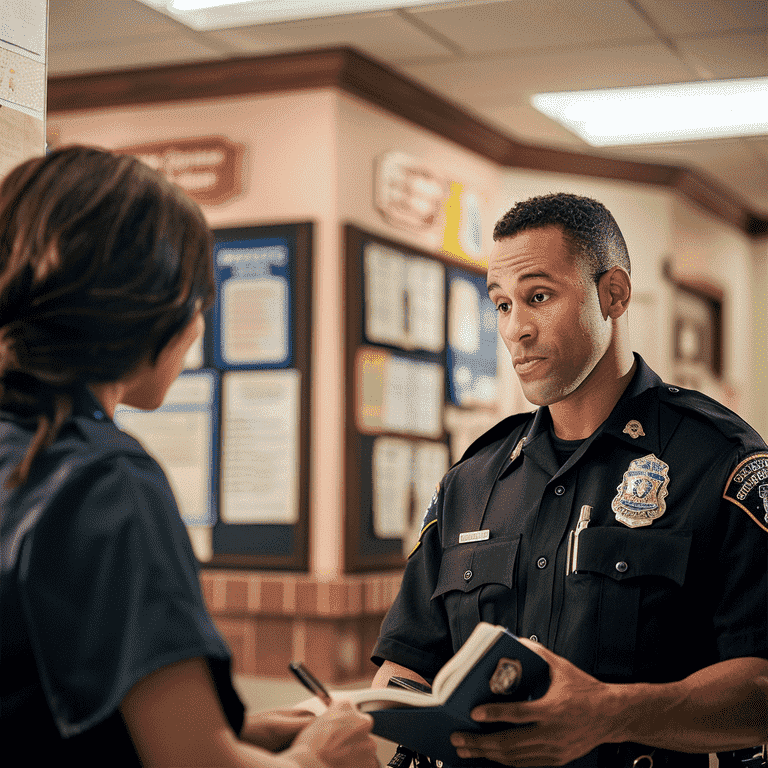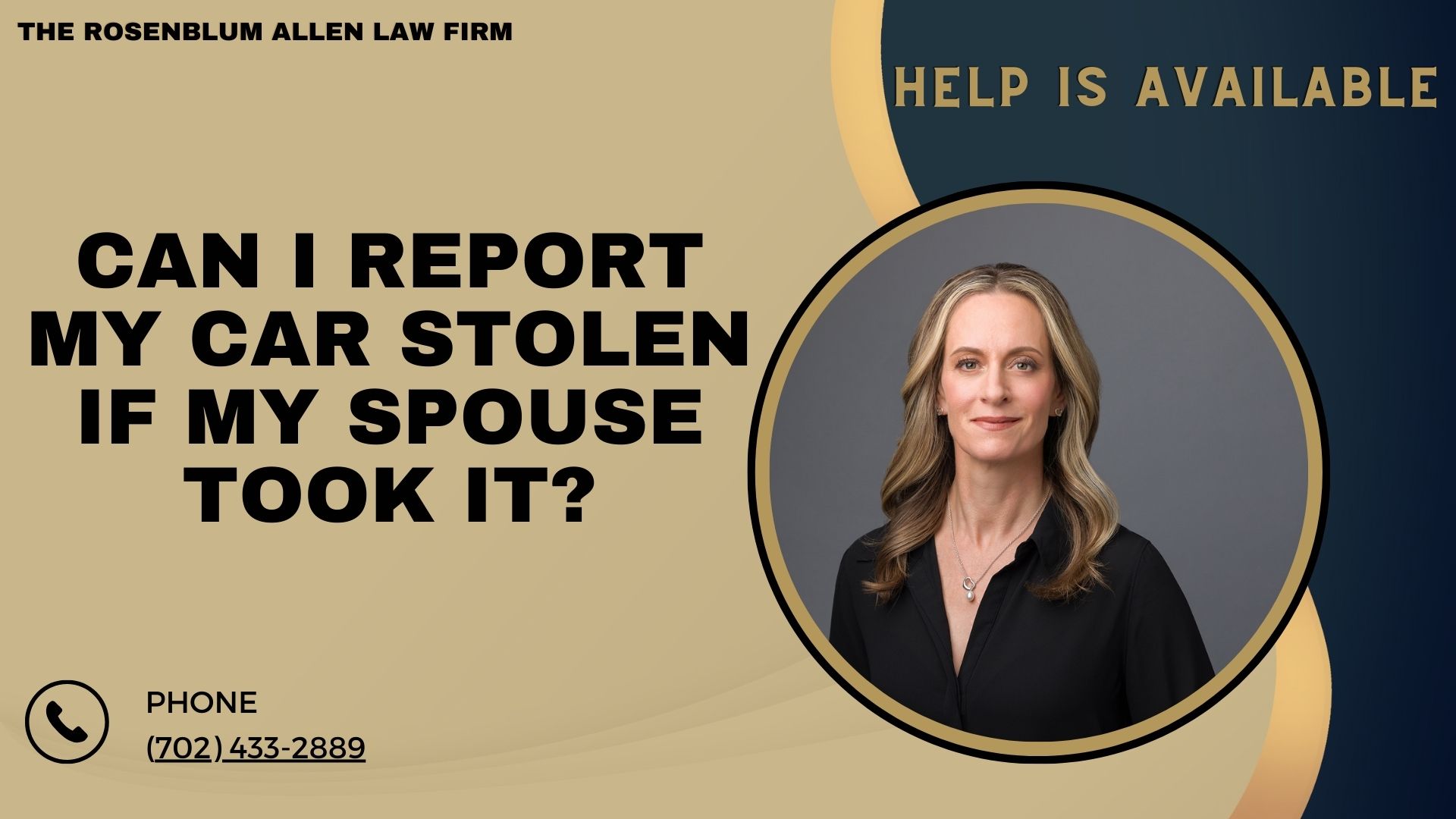Have you ever found yourself in a situation where your spouse took your car without asking? It can lead to a whirlwind of confusion and frustration. Before you jump to conclusions or make big decisions, you must understand the legal and practical results. They come from reporting your car stolen here. This guide will help you in these murky waters. It will inform you about your rights and the best steps to take next.
Understanding Legal Ownership of the Car
Establishing Who Owns the Car
The details matter when it comes to who legally owns a car. Ownership can affect legal rights. This is true in cases where your spouse takes your vehicle without permission.
Joint ownership: If the car is owned jointly, both parties have equal rights to its use. This common marriage scenario means that you and your spouse have legal permission to use the car.
Sole ownership: If only one spouse’s name is on the title, that person is the legal owner. However, the context of marriage can complicate this clear-cut rule.
Documentation Needed to Prove Ownership
Certain documents need to be readily available to clarify who owns the car. These include:
Title documents: The car’s title shows the owner’s name(s) and is the primary proof of ownership.
Registration and insurance information: These documents indicate who owns the car and can support your claim in legal discussions.

Legal Considerations Before Reporting the Car Stolen
Definition of Theft Under Law
Theft is taking someone’s property without permission. The taker intends to keep it. However, the lines can get blurry when it comes to marital property.
General legal definition of theft: Unauthorized taking of property with intent to keep it from the rightful owner.
How marital property is treated differently: In many places, property acquired during marriage, including cars, might be considered joint property, regardless of whose name is on the title.
Marital Property and Use of Assets
You must understand marital property. This is crucial for deciding if you can report your vehicle as stolen.
Explanation of marital property: Assets acquired during the marriage are typically considered joint property. This includes vehicles purchased after you’ve tied the knot.
Scenarios where use might not constitute theft: If the car is marital property, one spouse using the vehicle is generally not considered theft, even if taken without prior discussion.

Steps to Take Before Reporting a Stolen Car
Communication With Your Spouse
The first step should always be to try to communicate with your spouse about the situation. This often resolves misunderstandings amicably.
Attempting to resolve the issue privately: Discuss why the car was taken without your permission and express your concerns.
When communication fails, next steps: If discussions don’t lead to a resolution, or if communication is not possible, it may be time to consider other options.
Seeking Legal Advice
It’s advisable to consult with a lawyer before taking any legal action. A legal professional can provide guidance based on your specific circumstances.
The importance of consulting with a lawyer: A lawyer can help clarify your legal rights and determine the best course of action.
What to discuss with your lawyer: Include details about the car’s ownership, your marriage, and any previous agreements you might have had about the vehicle.
This section has set the stage for understanding the initial steps and considerations. Be sure to review your legal documents and communicate openly before deciding.

How to Report Your Car Stolen
Contacting Law Enforcement
If you decide to report your car stolen, contacting the police is necessary. Here’s what you need to know:
What information to provide: Be ready to share your ID, the vehicle’s registration, and any evidence that supports your claim of sole ownership (if applicable).
How police may handle the report: The police will assess the information and determine how to proceed. They might consider the marital status and the ownership details before taking action.
Potential Legal and Personal Consequences
Reporting a car stolen when your spouse took it can have both legal and personal repercussions.
Legal repercussions for your spouse: If the car is considered personal property and not marital, your spouse could face criminal charges.
Personal and relational implications: This action can strain or irreparably damage your relationship with your spouse. Consider the emotional and practical consequences of this decision.

Alternatives to Reporting the Car Stolen
Mediation and Conflict Resolution
Before taking legal steps that might escalate the situation, consider mediation. It can be a less adversarial way to handle disputes:
Exploring mediation services: Look for local mediators who specialize in marital disputes. They can help facilitate a discussion to resolve the issue.
Benefits of resolving disputes amicably: Mediation can save money, time, and stress. It also helps preserve relationships and can lead to a more satisfactory resolution for both parties.
Temporary Agreements and Arrangements
If you’re not ready to make a final move, temporary arrangements might help.
Setting up temporary use agreements: Negotiate terms that allow both of you access to the vehicle at different times. Ensure these terms are clear and written down.
Legal documentation to support temporary arrangements: Have a simple agreement drafted by a lawyer that outlines the terms of use. This can prevent future misunderstandings and provide legal protection.

Breaking It All Down
Navigating the complex situation of a spouse taking a car without permission involves careful consideration of legal ownership, potential consequences, and the overall impact on your relationship. Before deciding to report the car stolen:
- Explore all communication avenues and seek legal counsel.
- Remember, alternatives like mediation and temporary arrangements can provide a less confrontational resolution to your problem.
- Always prioritize a solution that minimizes conflict and supports mutual respect and understanding between you and your spouse.

Frequently Asked Questions
What if my spouse claims they didn’t know they needed permission to use the car?
In cases of a permission misunderstanding, it’s essential to clarify usage rules for the future. Documenting this understanding can help prevent similar issues.
Can I change the locks or install a tracking device on my car to prevent this from happening again?
You can take preventive measures like changing the locks or installing a tracking device. However, discussing these actions with your spouse is a good idea. It’s also advisable to consult a lawyer to ensure they’re legal.
What should I do if my spouse has taken the car out of state?
If your spouse takes the car out of state, it’s a more serious issue. Contact a lawyer to understand your legal options, including filing a report if the action breaks pre-agreed terms or court orders.
Can I report the car as missing instead of stolen to avoid legal issues for my spouse?
Reporting the car as missing can be an alternative to reporting it stolen, but law enforcement might view it differently. This could reduce the legal risk for your spouse.
What if we’re in the process of getting a divorce?
If you’re in a divorce, the situation might be handled differently. Consult your divorce attorney for advice based on your divorce agreement and any temporary orders.
Are there specific laws that protect the right to use a car if one spouse is the primary caregiver for children?
In many regions, the main caregiver might have certain vehicle privileges, especially if the vehicle is essential for child care. Legal advice is necessary to understand how these privileges apply to your situation.
How can I prove that my spouse took the car without my permission?
Evidence such as text messages, emails, and witness statements where your spouse admits taking the car without permission can be helpful. A lawyer can assist in gathering and presenting this evidence effectively.
What can I do if I fear my spouse may retaliate for reporting the car stolen?
If you fear retaliation, it’s important to ensure your safety. You may seek a restraining order and discuss your concerns with the police and your lawyer.

Glossary
Marital Property: Assets acquired by either or both spouses during their marriage. According to state laws, marital property can include real estate, vehicles, and other significant assets and is subject to division upon divorce.
Sole Ownership: A condition where only one individual legally owns a property or asset, indicated by their name, and is the only one listed on legal documents such as a car title or real estate deed.
Joint Ownership is a form of ownership in which two or more persons share the legal possession of a property or asset. In marriage, joint ownership typically implies that both spouses have equal rights to the use and disposition of the property.
Theft is taking someone else’s property without permission to deprive them of it permanently. Legal definitions can vary slightly by jurisdiction but generally involve elements of unauthorized taking and intent.
Mediation: A form of alternative dispute resolution (ADR) where a neutral third party, called a mediator, helps disputing parties find a mutually agreeable solution to their conflict without going to court.
Legal Counsel: Professional legal advice from a qualified attorney. Consulting legal counsel often involves discussing personal or sensitive information to receive legal rights and obligations guidance.
Temporary Agreements: Legally binding contracts intended to last for a limited period. These can include agreements on using assets like cars during separations or pending divorce proceedings.
Retaliation: Actions to punish or harm someone in response to a perceived wrong. In legal contexts, retaliation can refer to punitive measures taken against someone who has made a complaint or reported a violation.
Restraining Order: A legal order issued by a court to protect a person from being physically or sexually abused, threatened, stalked, or harassed. Restraining orders can also include provisions that limit the aggressor from taking specific actions, such as moving a shared asset or contacting the protected individual.
Documentation: Official papers or records that provide proof of something. Documentation is often required in legal matters to establish facts, such as proof of ownership or evidence of an agreement.

Additional Resources for You
As you navigate through these challenging times, it’s important to have reliable resources at your disposal. Our lead attorney, Molly Rosenblum Allen, Esq., has developed several comprehensive guides and articles that may be of help. Whether you’re seeking specific advice on divorce processes in Nevada or looking for general guidance on how to manage through these difficult periods, these resources are designed to provide valuable assistance.
- Las Vegas Divorce Attorney: Explore your options and understand the divorce process in Las Vegas. Read more
- Nevada Divorce: A detailed guide to divorce laws and procedures in Nevada. Learn more
- Surviving Divorce: Tips and strategies for coping with divorce. Discover how
- What Happens If You Don’t Sign Divorce Papers: Understand the implications of not signing divorce papers. Find out more
- Do I Need an Attorney to Get a Divorce: Exploring whether legal representation is necessary for your divorce. Read the guide
- What is a Collaborative Divorce: An explanation of collaborative divorce and its benefits. Learn about it
- How to Win a Divorce: Strategies that might give you an edge in divorce proceedings. Read here
- Switching Lawyers During Divorce: What to consider if you think about changing your lawyer mid-divorce. Understand the process
- How Long Does a Divorce Take in Nevada: Get an idea of the timeline for a divorce in Nevada. Check the duration
- High Conflict Divorce: Navigating through a high-conflict divorce and what you need to know. Explore strategies
- Questions to Ask a Divorce Lawyer: Prepare for your consultation with key questions to ask. Prepare your questions
Each of these resources has been carefully crafted to address the unique challenges you may face and provide you with knowledgeable support. Make sure to explore these links for in-depth information and guidance tailored to your needs.

Outside Resources for You
American Bar Association (ABA): Offers extensive information on family law and resources for finding lawyers. Visit the ABA
National Domestic Violence Hotline: Provides crucial support and legal resources for those experiencing domestic issues during a divorce. Access the Hotline
FindLaw: A comprehensive resource for free legal information on a variety of topics including divorce. Explore FindLaw
DivorceNet: By Nolo, offers articles, FAQs, and state-specific legal information on divorce. Check out DivorceNet
WomensLaw: Offers legal information and resources focused on the rights of women and children, including sections on divorce and custody. Visit WomensLaw
AVVO: Features legal advice, detailed articles, and a Q&A forum where users can ask lawyers specific questions about divorce. Go to AVVO
Psychology Today: Provides a directory of therapists who can offer emotional support and counseling during the divorce process. Find a therapist on Psychology Today

A Special Message from Our Lead Attorney, Molly Rosenblum Allen, Esq

Thank you for taking the time to review our resources. We understand that navigating a divorce can be challenging, and we’re here to provide you with the legal support you need. If you’re ready to discuss your situation and see how we can assist you, please don’t hesitate to call me and my team at (702) 433-2889.
We look forward to helping you move forward with confidence.
Best regards,
Molly Rosenblum Allen, Esq.
The Rosenblum Allen Law Firm



